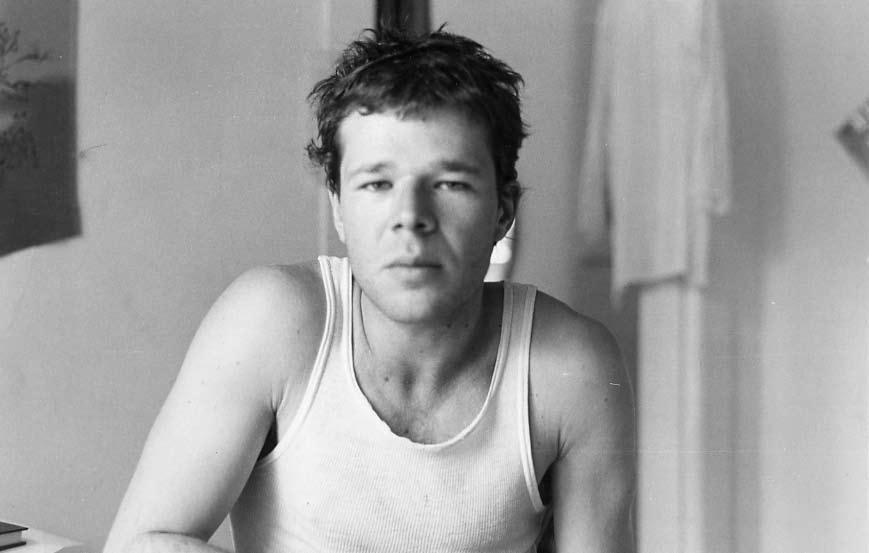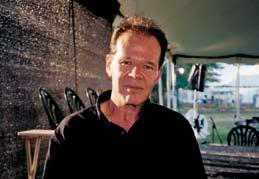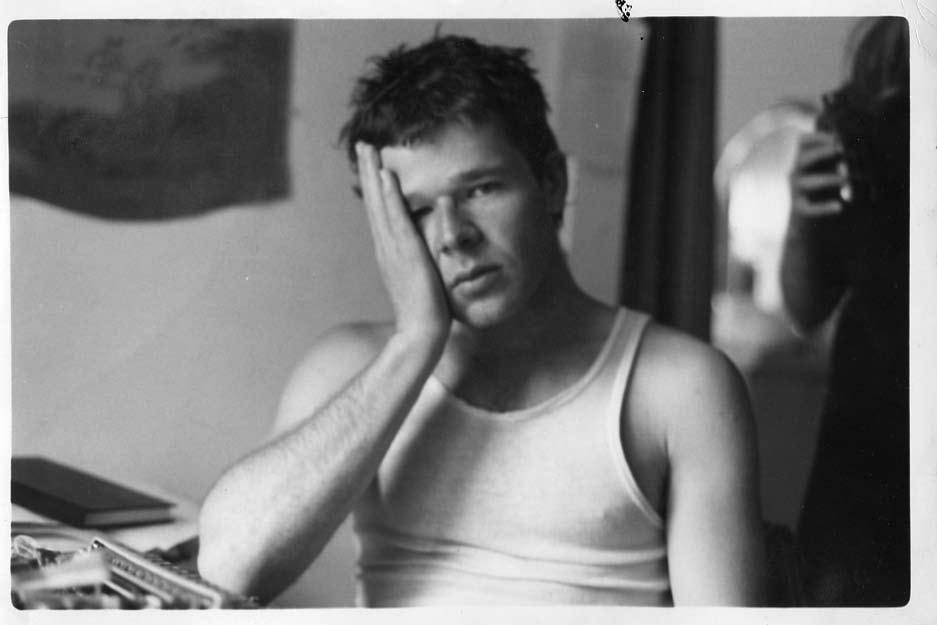
8 minute read
Franz Wright
Franz Wright’s most recent book, Earlier Poems (Knopf 2007), is his first four books collected. The gentle yet troubled voice that is peculiarly his own is recognizable in the first poem in the book and keeps a continuity throughout.
Advertisement
Wright, to judge from this collection, had found his voice, or it had found him, right from the start. In his younger years his life had much of the abysmal hard knocks of the American underground, yet the effect of it was to enhance and not degrade his sensitivity. Unnamable psychological states, tonal mastery, and an inventive style make these poems beautiful, haunting, and memorable. I recently asked Mr. Wright a series of questions, some of them about the poems found in this book. Your most recent book, Earlier Poems, is your first four books collected. While writing “The One Whose Eyes Open When You Close Your Eyes,” where did you live? Did you have a job, friends, favorite hangout, high hopes for the future? What was your life like as a young poet?
The poems in that first collection I wrote between the ages of 18 and, I guess, 27, something like that. It was finished not long after my dad’s final illness and death in New York in 1980. After I graduated from high school in 1971, I traveled around Europe for a few months, returned and spent some time with my dad in New York, returned to California (where I’d gone to high school) and worked at a gas station on Telegraph Avenue in Berkeley, then started at Oberlin College in northern Ohio in January 1972. I graduated from Oberlin in 1977 and tried grad school for a few months but it very quickly became apparent to me that I was not cut out for the MFA route, so I left and a period of years of wandering began—I lived all over the country, though mainly in New York and New England. I was very serious about writing. That always came first, and frankly, when I look back, I am not sure how I survived. It was a different time, there was a more optimistic spirit in the country, and financially it was easier, I guess. I was always broke, but I didn’t feel poor. I had wonderful friends who helped me survive. And I had more lives than a cat.
One of my favorites in Earlier Poems is “Asking for my Younger Brother.” Can you tell me a little about how this poem came to be?
My brother had a much harder time than I did growing up. When my father left my mother (and, incidentally, my brother and me), he was only three, while I was a fairly independent and rowdy eight-yearold. My mother drove the three of us across country from Minneapolis to San Francisco in 1961. Later my mother remarried a guy who turned out to be incredibly brutal toward us, and my brother was always running away. So this was one time I went looking for him in Reno, Nevada. I left “home” when I was eighteen and never really went back.
I find some of your poems to be tragic, but they’re always resonating and entertaining. In other words, your poems are enjoyable to read. How important is it to entertain a reader?
I’m not especially interested in trying to entertain anyone. I was just trying to make poems that were simple and clear and mysterious, to some degree—spontaneous-seeming but with depths. Poems that were, I used to say, completely concrete and completely unparaphrasable, like reality. Your poem “My Brother Takes a Hammer to the Mirror” is dedicated to the memory of Thomas James. Who is Thomas James and what kind of influence did he have on you?
Thomas James published one very beautiful collection of poems in the mid-seventies and not long after apparently took his own life, as people sometimes do. I don’t know anything about him, though I recall rumors of conflicted sexual identity, maybe some drugs were involved, nothing terribly unusual—I sensed in the title poem of his book, Letters to a Stranger, that he was drawn to or felt an ambivalent love for the Catholic Church, and I identified with that.
Some poets feel uncomfortable writing so personally, and others have subjects that they feel are untouchable: family, work, or eroticism. Is there any subject you avoid? If not, which subject do you find most challenging?
I write about whatever presents itself to me—I don’t feel limited to any particular subject or mood. Language seems to dictate content, and whatever content there is seems to me fairly irrelevant until I am close to finishing a poem. I never know what I am going to write next until I find myself immersed in it.
While reading the books in Earlier Poems, I noticed the first two books were serious in tone, whereas the last two books have more moments of dark humor, which is characteristic of your recent work. Did you eventually start to see the comedy in tragic situations? And do you think humor can be related to coping or healing?
I don’t know that there was anything deliberate about the appearance of a kind of dark humor—maybe it was just part of my personality (it runs in my family), and I reached a point where I felt confident enough in my writing to allow it to enter in a bit.

You were recently the poet-in-residence at Brandeis University. You’ve also taught workshops in Provincetown and Emerson. Are there certain “tips” regarding craft or process that you always tell your students? Will you share one?
I haven’t done that much teaching, and when I do, I prefer teaching literature courses. Workshops can be fun, or dreadful, depending on rapport with the students, and I don’t have anything against them—I try to get students to read a lot of poetry and become familiar with English prosody—though I think a writing workshop is the wrong place for a young person who is actually serious about becoming a writer.
Are there any poems in these first four books (Earlier Poems) that you think of as pivotal, ones that changed your approach, poems where you had a stylistic breakthrough?
Actually, there are a number of poems which would fit your description— when I wrote “Alcohol”, for example (in Provincetown in the fall of 1983 while standing at the bar of an establishment I probably should not have been in, and while listening to some ear-shattering blues band, this poem more or less appeared before my eyes in its finished form, and I had to get out of there and write it down fast). I’d been reading a lot of Beckett and Pinter, and I think suddenly saw the possibility of a very stripped down kind of inner soliloquy, or a dramatic work in miniature which nevertheless possessed the sense a lyric poem can convey—with its access to certain improvisational uses of music and rhythm and syntax and lineation—of something infinite somehow housed in a little box that closes, as Yeats put it, with a satisfying click.
A short poem like “Untitled (Will I always be eleven...)” gave me an even more startling example of a certain knack I was trying to develop for a certain form of devastating understatement— while still preserving, behind its apparent plainness of diction, in a deniable or seemingly effortless way, an acute awareness of music and form. I learned to count every syllable a thousand times in an eleven-line poem like that one.
And in a piece like “Boy Leaving Home,” I found a way to write a long poem—and this is something that later came to interest me again when I was putting together my more recent last three collections—with subvertible narrative qualities as well as, once again, a lot of the qualities of the short intense lyric of the kind I love, one that is severely formal and at the same time wildly and unpredictably open and free.
What are some of the changes you have seen in American poetry since you first began writing? Do you feel positively, negatively, or indifferent to current trends or schools of thought?
As far as different schools of thought, I think the differences between different poets have become grotesquely exaggerated on account of the introduction in what passes for literary criticism now of the crudest sort of highly personal venom on the part of writers who no doubt have much in common— at least their love of poetry!
I’ve mentioned (and this may come as a shock to some) my love of very formal poetry, yet I’m drawn as well to certain avant-garde experiments with language itself. Now in my own private opinion, a lot of the formal or the language-oriented poetry that has been written in this country over the past thirty or so years is so excruciatingly soulless and boring that it’s a true shame. I myself feel perfectly free to avail myself of any of the vastly various dimensions of the poem, from the most inscrutable and hermetic to the most nakedly simple and literal.
Another big change that’s occurred over time is of course the proliferation of writing programs and now the internet—both of which, in my own humble and private opinion, are robbing young poets of the necessary decade (at least) of unselfconscious obscurity in which, by torturous trial and error on the past of someone with genuine talent, a few real poems might be written. I think that the more poetry gets written, the rarer poetry becomes. However, no doubt fate, as it always does, will conspire with circumstances to torture a few solitary sufferers into poetry and keep the whole thing going.
You have a chapbook coming out with Vallum in Winter 2007. What other projects do you have in the works? Will you share a recent poem?
I also have another chapbook prepared for fall publication by Marick Press in Michigan called Wheeling Motel. And I can’t give you that poem, as it is forthcoming in a well-known magazine that might frown on its appearing anywhere else, but I think I can share a poem that has already appeared (in the still-marvelous-after-all-these-years Field Magazine, in whose pages I’m proud to say I first started to publish poems back in the mid-seventies).

Franz Wright, 1979

